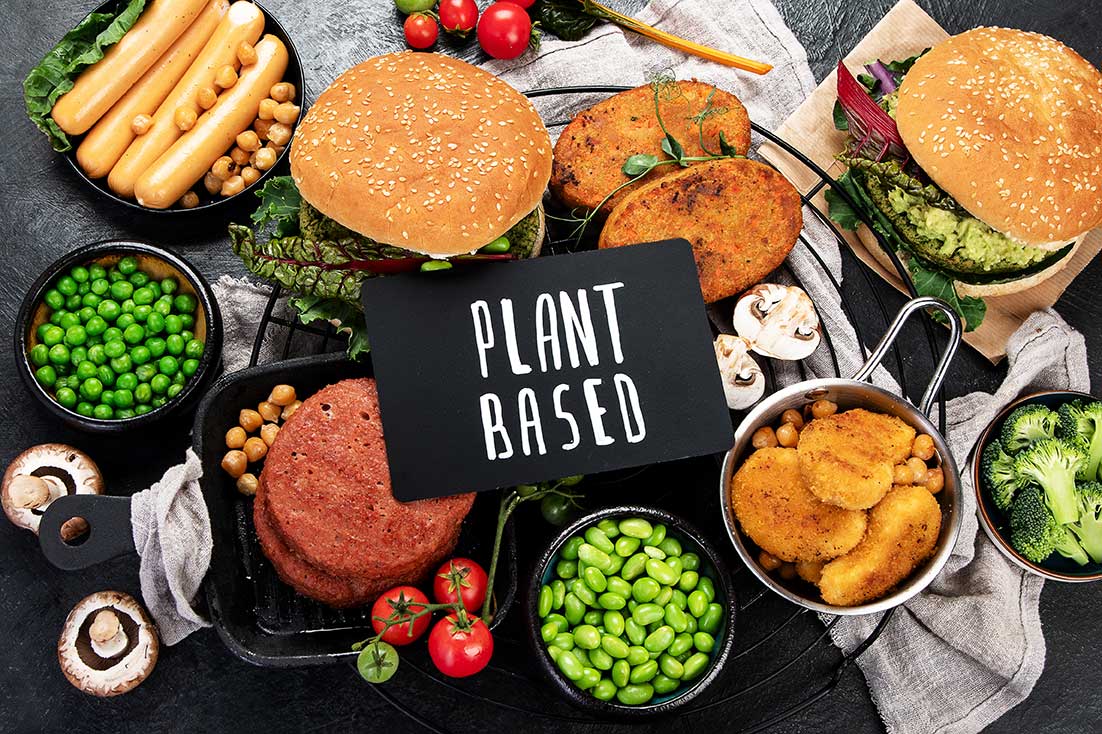Everything About Healthy And Balanced Food: Advantages of Enjoying Plant Based Choices
The conversation surrounding plant-based diet plans has gained significant attention in recent times. Several people are checking out the prospective health and wellness benefits, dietary benefits, and environmental impacts related to these nutritional selections. As individuals end up being more knowledgeable about their food's impact on wellness and sustainability, questions arise concerning the functionalities of embracing such a lifestyle. What details adjustments can one expect, and how might these selections reshape not only individual health and wellness but additionally the world's future?
Recognizing Plant-Based Diet Plans
Several people link plant-based diets mostly with vegetarianism or veganism, these diet plans can incorporate a broad array of eating patterns that focus on whole, minimally refined plant foods. Such diets usually include fruits, veggies, whole grains, beans, nuts, and seeds, while eliminating or restricting pet products. This versatility permits individuals to customize their nutritional choices according to nutritional needs and individual choices. Some might adopt a mostly plant-based diet while still sometimes consuming meat or milk, frequently described as a flexitarian approach. The focus continues to be on incorporating more plant foods, which can cause a varied selection of meals and flavors. Understanding these different analyses of plant-based consuming is essential for valuing its access and allure in contemporary food culture.
Health And Wellness Perks of Plant-Based Foods
The wellness advantages of plant-based foods are substantial, supplying a nutrient density advantage that sustains overall health. Research study suggests that these foods can enhance heart wellness and play an essential function in efficient weight administration. By integrating a lot more plant-based choices, people may improve their dietary choices and promote long-term wellness.
Nutrient Thickness Benefit
Nutrient thickness plays a necessary function in the health and wellness benefits of plant-based foods, making them a compelling choice for those looking for a well balanced diet plan. Plant-based foods, such as fruits, vegetables, legumes, nuts, and whole grains, are often abundant in crucial vitamins, minerals, and anti-oxidants while being lower in calories. This high nutrient density allows people to take in fewer calories while still meeting their dietary requirements. Furthermore, these foods are packed with nutritional fiber, advertising gastrointestinal health and assisting in weight monitoring. By integrating nutrient-dense plant-based options, customers can enhance their overall wellness, support their body immune systems, and lower the danger of chronic conditions. Eventually, the nutrient density of plant-based foods highlights their significance in a health-conscious lifestyle.
Heart Wellness Improvement

Weight Administration Support
In enhancement to promoting heart wellness, a plant-based diet plan can considerably assist in weight management. This nutritional method stresses whole foods such as fruits, veggies, vegetables, nuts, and entire grains, which are normally reduced in calories and higher in fiber contrasted to animal-based products. The high fiber content helps increase satiation, lowering general calorie consumption. Moreover, plant-based diets are commonly rich in necessary nutrients while low in unhealthy fats, making it less complicated to keep a healthy weight. Plant Based Beef. Research indicates that people that adopt a plant-based way of life often tend to have reduced body mass indexes (BMIs) and experience more successful fat burning compared to those who take in meat-heavy diet regimens. Subsequently, embracing plant-based choices is a calculated selection for effective weight management
Nutritional Value of Plant-Based Components
Plant-based active ingredients are abundant in crucial nutrients, offering a diverse array of vitamins, minerals, and antioxidants that contribute to overall health and wellness. A comparison of protein sources reveals that while animal products are typically considered as premium, several plant-based alternatives give ample healthy protein and various other valuable substances. Comprehending the nutritional value of these ingredients can help individuals make informed nutritional selections.
Crucial Nutrients in Plants
Nutrient-rich active ingredients located in plants use a diverse range of vital minerals and vitamins that contribute greatly to total wellness. These components are rich in vitamins A, C, and K, which support immune feature, vision, and blood clot, respectively. Additionally, plants give crucial minerals such as magnesium, potassium, and calcium, essential for heart health, muscular tissue function, and bone strength. The existence of fiber in plant-based foods aids food digestion and promotes a healthy and balanced digestive tract microbiome. Antioxidants, located generously in vegetables and fruits, assistance combat oxidative stress and anxiety and reduce inflammation. Furthermore, many plant foods are low in calories yet high in nutrients, making them an excellent selection for those seeking to keep a healthy and balanced weight while making sure optimal nutrient intake.
Contrasting Healthy Protein Sources
Protein sources differ substantially in their dietary profiles, with plant-based ingredients offering unique benefits. Unlike pet proteins, which frequently contain hydrogenated fats and cholesterol, plant healthy proteins have a tendency to be lower in these harmful parts. Legumes, nuts, seeds, and whole grains are rich in essential amino acids, fiber, vitamins, and minerals. For example, lentils supply high protein content along with considerable iron and folate, while quinoa is a complete protein, providing all 9 necessary amino acids. In addition, plant-based proteins are usually gone along with by antioxidants and phytochemicals that sustain overall health and wellness. The shift to plant-based healthy protein sources not just enhances dietary consumption however additionally lines up with lasting dietary techniques, decreasing ecological impact and advertising long-term health benefits.
Environmental Impact of Plant-Based Consuming
As awareness of environment modification expands, lots of people are discovering lasting dietary selections that can significantly decrease their environmental footprint. Plant-based consuming has become a significant factor to lowering greenhouse gas emissions, which are largely connected with livestock manufacturing. The farming of fruits, veggies, grains, and legumes normally requires fewer resources, such as water and land, contrasted to animal farming. In addition, plant-based diet plans can cause decreased logging, as less land is required for grazing livestock or growing pet feed. By shifting towards plant-based choices, customers can sustain biodiversity and promote healthier ecological communities. Overall, embracing plant-based eating not just benefits personal health and wellness however likewise represents a vital action towards ecological sustainability and preservation initiatives.
Overcoming Common Misconceptions
While several people identify the advantages of a plant-based diet, several misunderstandings commonly prevent them from totally embracing this lifestyle. A common idea is that plant-based diet regimens do not have sufficient healthy protein; nonetheless, countless plant resources, such as vegetables, nuts, and tofu, offer sufficient protein. Additionally, some think that this diet regimen is costly, when as a matter of fact, staples like beans, rice, and seasonal vegetables can be quite economical. Another false impression is that plant-based eating is excessively restrictive, whereas it actually provides a diverse array of foods and tastes. Many fret that a plant-based diet might lead to deficiencies, yet with correct planning, individuals can acquire all necessary nutrients, consisting of vitamins and minerals, while enjoying a vast variety of scrumptious meals. Vast Tips for Transitioning to a Plant-Based Way of life
Making the change to a plant-based way of life can be an enriching experience, though it commonly requires some support to navigate the first changes. Initially, people are encouraged to begin gradually, including more fruits, vegetables, legumes, and whole grains right into their meals while minimizing meat and dairy intake. Meal planning is crucial; preparing a weekly menu can assist reduce the change and avoid final harmful selections. Exploring new recipes and cooking techniques can also enhance the experience and preserve enjoyment concerning plant-based eating. Additionally, joining support system or neighborhoods can give motivation and share useful pointers. Ultimately, remaining educated concerning nourishment guarantees well balanced dishes, preventing deficiencies while fostering a healthy and balanced, satisfying plant-based lifestyle.
Delicious Plant-Based Meal Concepts
Exploring tasty plant-based dish concepts try this out can inspire people to welcome a more healthy diet regimen. One popular choice is a passionate quinoa salad, including cherry tomatoes, cucumber, and a tangy lemon-tahini clothing. An additional fave is a tasty lentil stew, loaded with carrots, celery, and great smelling herbs, ideal for a soothing supper. For morning meal, overnight oats made with almond milk, chia seeds, and covered with fresh berries give a healthy beginning to the day. In addition, a vibrant vegetable stir-fry with tofu and a range of vibrant veggies can be a fast yet pleasing meal. Creamy avocado toast on whole-grain bread, sprinkled with seeds and flavors, offers an easy yet tasty snack. These meals showcase the variety and richness of plant-based eating.

Frequently Asked Inquiries
Can a Plant-Based Diet Plan Offer Sufficient Healthy Protein?
The question of whether a plant-based diet regimen can supply sufficient healthy protein prevails. Numerous resources, including beans, nuts, seeds, and whole grains, can fulfill protein requires successfully, supporting a well balanced and nutritious diet regimen for individuals.
Are Plant-Based Diet Regimens Suitable for Kid?
The suitability of plant-based diet regimens for children relies on careful preparation. Sufficient nutrients have to be guaranteed, consisting of healthy proteins, minerals, and vitamins. With appropriate advice, such diet plans can sustain healthy growth and growth in children.
Exactly how Do I Eat in restaurants on a Plant-Based Diet?
Eating in restaurants on a plant-based diet regimen involves looking for dining establishments with varied food selections, requesting for why not try this out alterations, and discovering vegan-friendly options. Planning in advance and connecting dietary preferences can boost the eating experience while maintaining dietary selections.
What Are Common Allergens in Plant-Based Foods?
Typical irritants in plant-based foods consist of soy, gluten, nuts, and seeds - Sugar Free Sauces. People following a plant-based diet ought to understand these irritants and review tags thoroughly to prevent damaging reactions and guarantee secure intake
Can Plant-Based Diets Assist With Weight Management?
Research study indicates that adopting a plant-based diet regimen may assist in weight management as a result of its commonly reduced calorie thickness and greater fiber web content. This mix can boost satiation, aiding people handle their calorie intake successfully. Lots of individuals connect plant-based diet plans generally with vegetarianism or veganism, these diet regimens can incorporate a vast array of consuming patterns that prioritize whole, minimally processed plant foods. Nutrient thickness plays a crucial duty in the wellness advantages of plant-based foods, making them a compelling choice for those looking for a well balanced diet plan. Plant-based diet plans have been revealed to markedly boost heart wellness, as they commonly include elements that sustain cardio function. In enhancement to promoting look at this web-site heart health, a plant-based diet regimen can considerably help in weight management. A common idea is that plant-based diet plans lack enough protein; however, countless plant sources, such as legumes, nuts, and tofu, give adequate protein.